Unit 1 How can we become good learners. Section A(4a-4c)+Section B(1a-1e) (共17张PPT)
文档属性
| 名称 | Unit 1 How can we become good learners. Section A(4a-4c)+Section B(1a-1e) (共17张PPT) |
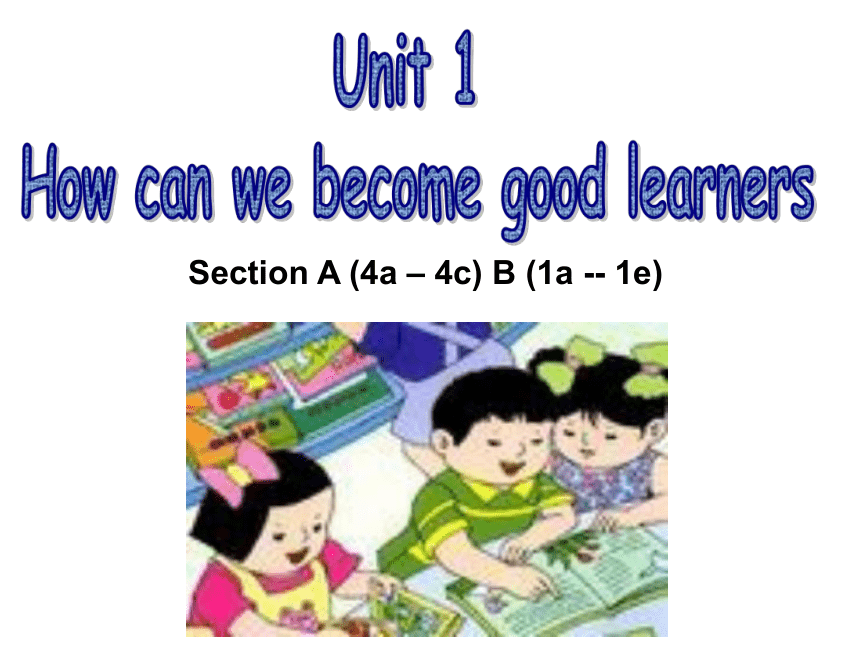
|
|
| 格式 | zip | ||
| 文件大小 | 1.3MB | ||
| 资源类型 | 教案 | ||
| 版本资源 | 人教新目标(Go for it)版 | ||
| 科目 | 英语 | ||
| 更新时间 | 2018-10-13 00:00:00 | ||
图片预览

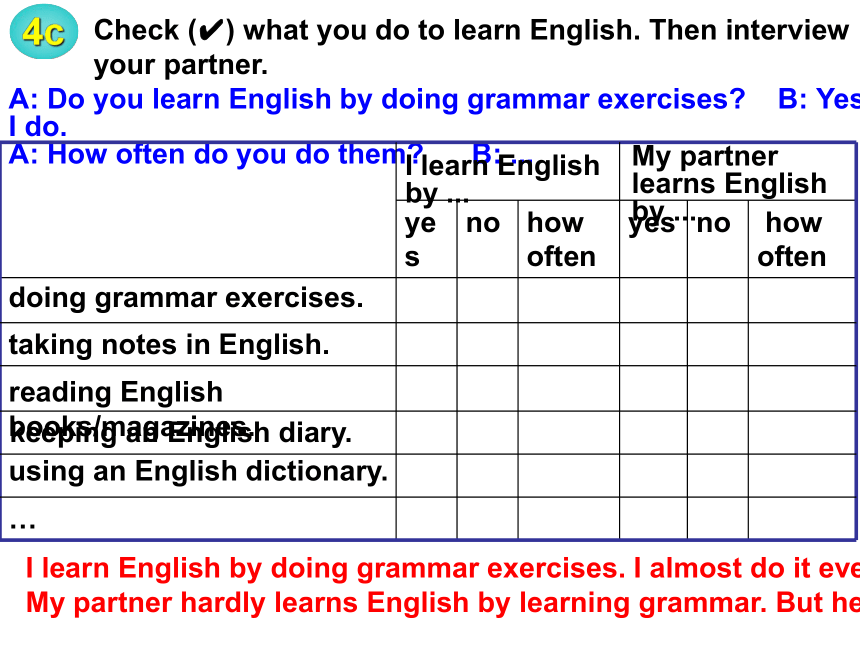
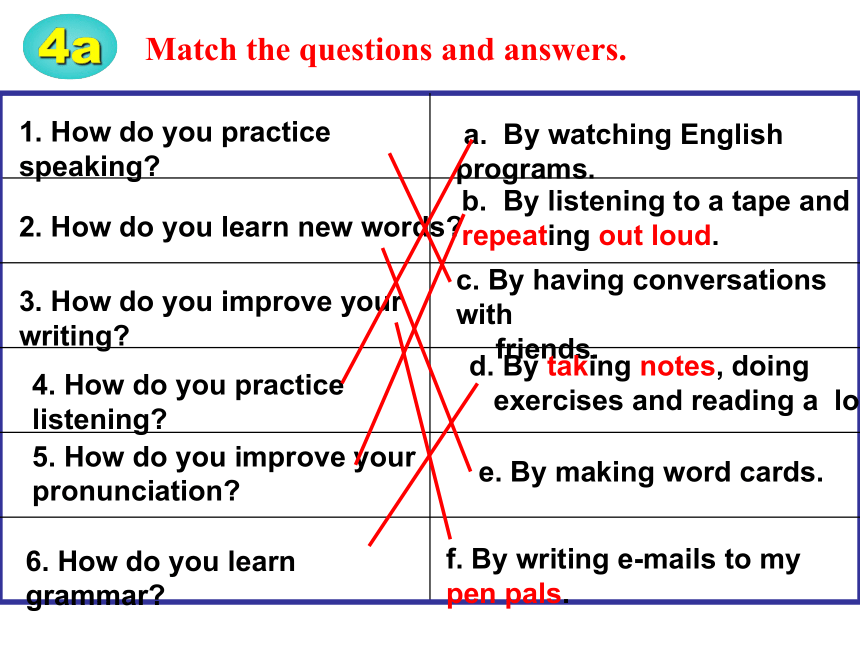
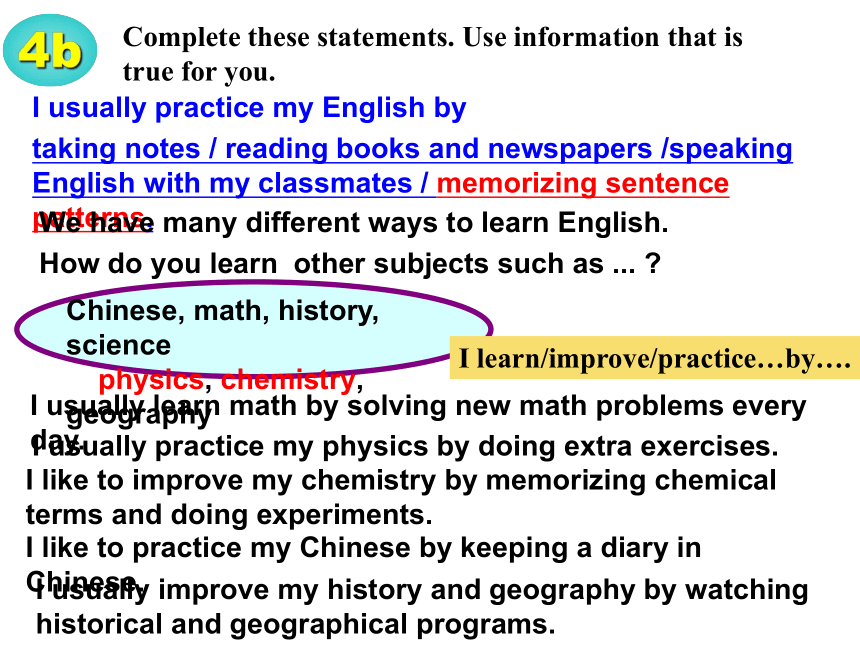
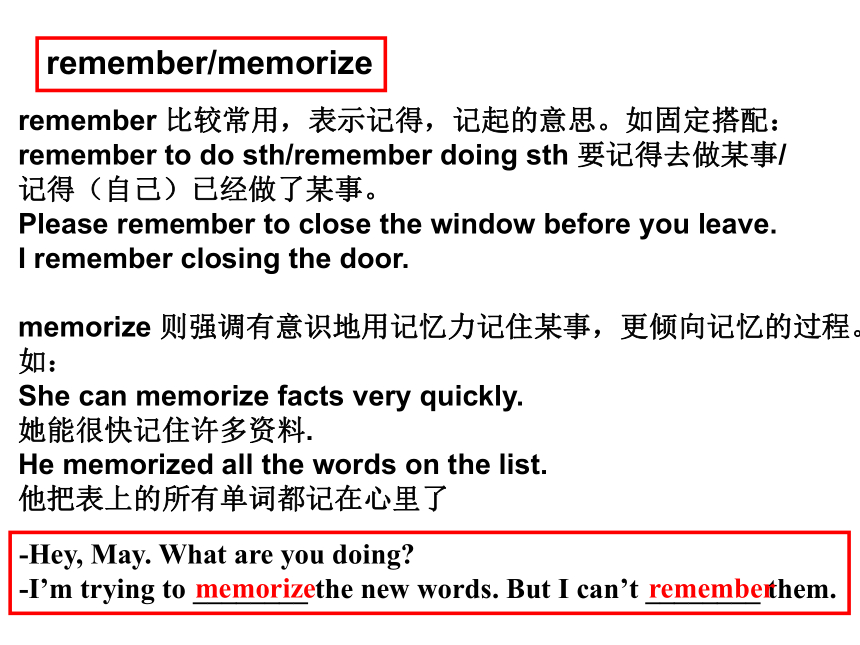
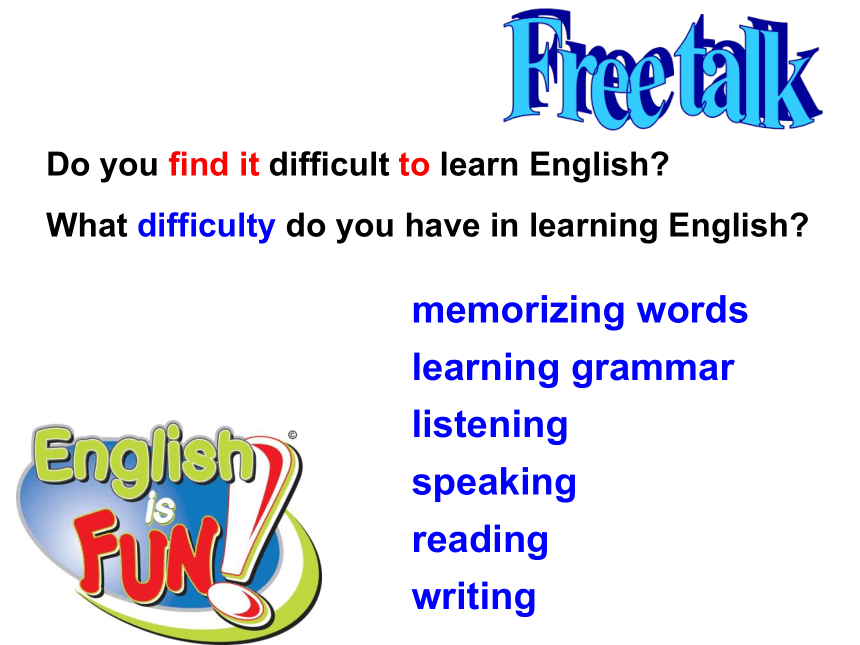
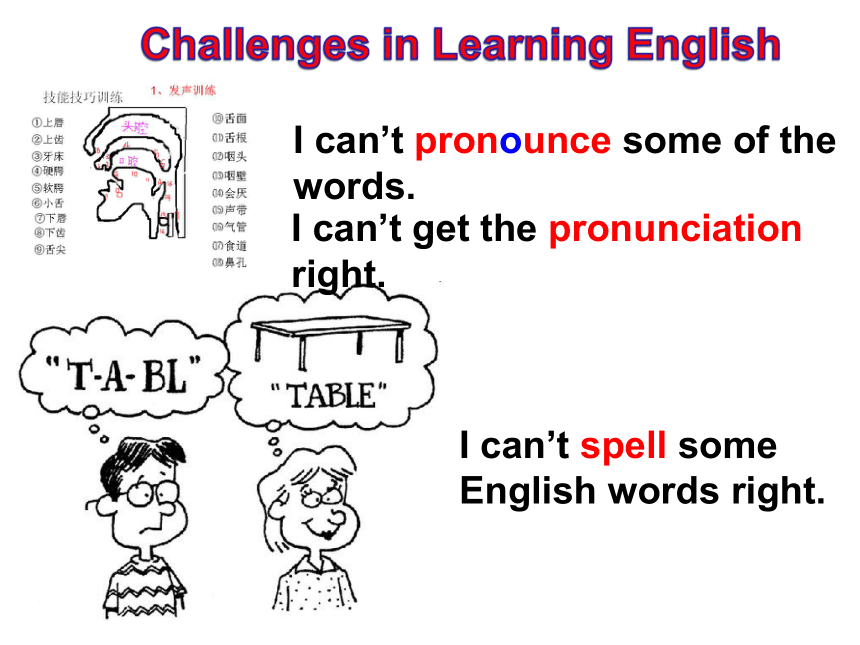
文档简介
Section A (4a – 4c) B (1a -- 1e)
4c
A: Do you learn English by doing grammar exercises? B: Yes, I do.
A: How often do you do them? B: ...
Check (?) what you do to learn English. Then interview your partner.
doing grammar exercises.
taking notes in English.
reading English books/magazines.
keeping an English diary.
using an English dictionary.
I learn English by ...
My partner learns English by ...
I learn English by doing grammar exercises. I almost do it every day….
My partner hardly learns English by learning grammar. But he/she….
yes no how often yes no how often
…
4a
Match the questions and answers.
1. How do you practice speaking?
a. By watching English programs.
2. How do you learn new words?
3. How do you improve your writing?
5. How do you improve your pronunciation?
4. How do you practice listening?
6. How do you learn grammar?
b. By listening to a tape and repeating out loud.
c. By having conversations with
friends.
d. By taking notes, doing
exercises and reading a lot.
e. By making word cards.
f. By writing e-mails to my pen pals.
I usually practice my English by
taking notes / reading books and newspapers /speaking English with my classmates / memorizing sentence patterns.
4b
Complete these statements. Use information that is true for you.
How do you learn other subjects such as ... ?
We have many different ways to learn English.
I usually learn math by solving new math problems every day.
Chinese, math, history, science
physics, chemistry, geography
I usually practice my physics by doing extra exercises.
I like to improve my chemistry by memorizing chemical terms and doing experiments.
I like to practice my Chinese by keeping a diary in Chinese.
I usually improve my history and geography by watching historical and geographical programs.
I learn/improve/practice…by….
remember 比较常用,表示记得,记起的意思。如固定搭配:
remember to do sth/remember doing sth 要记得去做某事/
记得(自己)已经做了某事。
Please remember to close the window before you leave.
I remember closing the door.
memorize 则强调有意识地用记忆力记住某事,更倾向记忆的过程。
如:
She can memorize facts very quickly.
她能很快记住许多资料.
He memorized all the words on the list.
他把表上的所有单词都记在心里了
remember 和 memorize 都可以翻译为“记,记住,记忆” remember 用法比较广泛,可以指任何任何对过去进行回顾的思想活动,不论是自愿的、有意的还是不自愿的、无意的,而且常常暗含过去某事物的生动形象给自己留下的深刻印象。 finally remembered the address. 最后终于想起了那个地址 I can’t remember what I said. 我记不得自己说了些什么。 I can still remember the special looks in her eyes the first time we met. 我仍然记得第一次见面时她那特别的眼神。memorize 通常指有意识的、努力的、费神的记忆活动。 I tried to memorize the speech word for word. 我竭力一字不差地记住演讲稿。 He studied the map, trying to memorize the route to Fragrant Hill. 他细看地图,尽力记住到香山的路线。 Memorize the password, they burn up the paper. 记住密码,然后把密码纸条烧掉。
remember 和 memorize 都可以翻译为“记,记住,记忆” remember 用法比较广泛,可以指任何任何对过去进行回顾的思想活动,不论是自愿的、有意的还是不自愿的、无意的,而且常常暗含过去某事物的生动形象给自己留下的深刻印象。 finally remembered the address. 最后终于想起了那个地址 I can’t remember what I said. 我记不得自己说了些什么。 I can still remember the special looks in her eyes the first time we met. 我仍然记得第一次见面时她那特别的眼神。memorize 通常指有意识的、努力的、费神的记忆活动。 I tried to memorize the speech word for word. 我竭力一字不差地记住演讲稿。 He studied the map, trying to memorize the route to Fragrant Hill. 他细看地图,尽力记住到香山的路线。 Memorize the password, they burn up the paper. 记住密码,然后把密码纸条烧掉。
remember/memorize
-Hey, May. What are you doing?
-I’m trying to ________ the new words. But I can’t ________ them.
memorize
remember
What difficulty do you have in learning English?
Do you find it difficult to learn English?
memorizing words
learning grammar
listening
speaking
reading
writing
I can’t pronounce some of the words.
I can’t spell some English words right.
I can’t get the pronunciation right.
I don’t know how to increase my reading speed.
I often make mistakes in grammar.
(read faster)
at high speed
I can’t understand spoken English.
I can’t understand written English.
I’m nervous when I try to speak English.
I don’t know enough words to write well.
1b What other things are difficult for you? Make a list.
1. I don’t know enough words to write well.
2. _______________________________________
3. _______________________________________
1c Paul finds it difficult to learn English. Listen and
complete the learning challenges he talks about.
Challenges
1. He can’t get the ____________ right.
2. He _________ a lot of new words.
3. He can’t always ___________ when
people talk to him.
4. He doesn’t get much __________
practice.
pronunciation
forgets
understand
writing
1d Listen again. Complete the solutions.
Solutions
1. __________ can help.
2. He can always ____________________ in his
notebook and study them at home.
3. He can __________________________ to
practice speaking.
4. He should find a ________ to practice writing.
Listening
write the new words
join an English language club
pen pal
(T: Teacher B: boy)
T: You look worried, Paul.
B: I am, Ms Manson. I’m having trouble learning English.
T: You said you liked English. What’s the problem?
B: I can’t get the pronunciation right.
T: Well, listening can help. Why don’t you listen to English
songs on the radio and repeat the difficult words?
B: That’s a good idea. But what about all the new words?
I forget a lot of new words.
T: You can always write the new words in your notebook and
review them from time to time. You can even study on the
subway on the way to school.
B: That might really help! Thanks.
problems solutions
T: Can you understand when people talk to you?
B: Well, not always. Sometimes I just don’t understand what
people are saying.
T: Why don’t you join an English language club to practice
speaking English? The English club meets after school on
Tuesdays and Thursdays.
B: Maybe I’ll go. The only other problem is that I don’t get much
writing practice.
T: Maybe you should find a pen pal.
B: That sounds like a fun way to practice writing. Thanks, Ms
Manson.
1e Role-play conversations using the information in 1c and 1d.
①
A: I don’t have a partner to practice English with.
B: Maybe you should join an English club.
②
A: I always forget the new words.
B: You can write the new words in your notebook and
review them from time to time.
Problems:
1. can’t get the pronunciation right
2. don’t understand what people are saying
3. don’t get much writing practice
Listen and fill in the blanks.
Paul _____ ______ because he is having ________ ______ English. First he can’t get the pronunciation_____. Then he can’t remember the new words and sometimes he can’t understand ______ people are saying in English. And he doesn’t get much________ ______. His teacher Ms. Manson tells him to listen to English songs ___ ____ ___ and ______ the difficult words. Then the teacher tells him to _____ the new words in the notebook and review them _____ ______ ____ ____or study on the subway ___ ___ ____ _____ school. At last the teacher asks him to _____ an English language club to _______ speaking and _____ a pen pal to get more ________ _______.
looks
worried
trouble
learning
writing
practice
from time
on the radio
repeat
write
to time
join
practice
find
on the way to
writing practice
right
what
You can become a very successful learner of English if you follow some basic rules.
1. Relax and enjoy speaking.
2. Learn about how you learn.
3. Learn memory techniques(技巧).
4. Lose yourself into English.
5. Get English connected with life.
6. Learn vocabulary systematically(系统地).
7. Get motivated(有动力): don’t put off
until tomorrow what you can do today.
4c
A: Do you learn English by doing grammar exercises? B: Yes, I do.
A: How often do you do them? B: ...
Check (?) what you do to learn English. Then interview your partner.
doing grammar exercises.
taking notes in English.
reading English books/magazines.
keeping an English diary.
using an English dictionary.
I learn English by ...
My partner learns English by ...
I learn English by doing grammar exercises. I almost do it every day….
My partner hardly learns English by learning grammar. But he/she….
yes no how often yes no how often
…
4a
Match the questions and answers.
1. How do you practice speaking?
a. By watching English programs.
2. How do you learn new words?
3. How do you improve your writing?
5. How do you improve your pronunciation?
4. How do you practice listening?
6. How do you learn grammar?
b. By listening to a tape and repeating out loud.
c. By having conversations with
friends.
d. By taking notes, doing
exercises and reading a lot.
e. By making word cards.
f. By writing e-mails to my pen pals.
I usually practice my English by
taking notes / reading books and newspapers /speaking English with my classmates / memorizing sentence patterns.
4b
Complete these statements. Use information that is true for you.
How do you learn other subjects such as ... ?
We have many different ways to learn English.
I usually learn math by solving new math problems every day.
Chinese, math, history, science
physics, chemistry, geography
I usually practice my physics by doing extra exercises.
I like to improve my chemistry by memorizing chemical terms and doing experiments.
I like to practice my Chinese by keeping a diary in Chinese.
I usually improve my history and geography by watching historical and geographical programs.
I learn/improve/practice…by….
remember 比较常用,表示记得,记起的意思。如固定搭配:
remember to do sth/remember doing sth 要记得去做某事/
记得(自己)已经做了某事。
Please remember to close the window before you leave.
I remember closing the door.
memorize 则强调有意识地用记忆力记住某事,更倾向记忆的过程。
如:
She can memorize facts very quickly.
她能很快记住许多资料.
He memorized all the words on the list.
他把表上的所有单词都记在心里了
remember 和 memorize 都可以翻译为“记,记住,记忆” remember 用法比较广泛,可以指任何任何对过去进行回顾的思想活动,不论是自愿的、有意的还是不自愿的、无意的,而且常常暗含过去某事物的生动形象给自己留下的深刻印象。 finally remembered the address. 最后终于想起了那个地址 I can’t remember what I said. 我记不得自己说了些什么。 I can still remember the special looks in her eyes the first time we met. 我仍然记得第一次见面时她那特别的眼神。memorize 通常指有意识的、努力的、费神的记忆活动。 I tried to memorize the speech word for word. 我竭力一字不差地记住演讲稿。 He studied the map, trying to memorize the route to Fragrant Hill. 他细看地图,尽力记住到香山的路线。 Memorize the password, they burn up the paper. 记住密码,然后把密码纸条烧掉。
remember 和 memorize 都可以翻译为“记,记住,记忆” remember 用法比较广泛,可以指任何任何对过去进行回顾的思想活动,不论是自愿的、有意的还是不自愿的、无意的,而且常常暗含过去某事物的生动形象给自己留下的深刻印象。 finally remembered the address. 最后终于想起了那个地址 I can’t remember what I said. 我记不得自己说了些什么。 I can still remember the special looks in her eyes the first time we met. 我仍然记得第一次见面时她那特别的眼神。memorize 通常指有意识的、努力的、费神的记忆活动。 I tried to memorize the speech word for word. 我竭力一字不差地记住演讲稿。 He studied the map, trying to memorize the route to Fragrant Hill. 他细看地图,尽力记住到香山的路线。 Memorize the password, they burn up the paper. 记住密码,然后把密码纸条烧掉。
remember/memorize
-Hey, May. What are you doing?
-I’m trying to ________ the new words. But I can’t ________ them.
memorize
remember
What difficulty do you have in learning English?
Do you find it difficult to learn English?
memorizing words
learning grammar
listening
speaking
reading
writing
I can’t pronounce some of the words.
I can’t spell some English words right.
I can’t get the pronunciation right.
I don’t know how to increase my reading speed.
I often make mistakes in grammar.
(read faster)
at high speed
I can’t understand spoken English.
I can’t understand written English.
I’m nervous when I try to speak English.
I don’t know enough words to write well.
1b What other things are difficult for you? Make a list.
1. I don’t know enough words to write well.
2. _______________________________________
3. _______________________________________
1c Paul finds it difficult to learn English. Listen and
complete the learning challenges he talks about.
Challenges
1. He can’t get the ____________ right.
2. He _________ a lot of new words.
3. He can’t always ___________ when
people talk to him.
4. He doesn’t get much __________
practice.
pronunciation
forgets
understand
writing
1d Listen again. Complete the solutions.
Solutions
1. __________ can help.
2. He can always ____________________ in his
notebook and study them at home.
3. He can __________________________ to
practice speaking.
4. He should find a ________ to practice writing.
Listening
write the new words
join an English language club
pen pal
(T: Teacher B: boy)
T: You look worried, Paul.
B: I am, Ms Manson. I’m having trouble learning English.
T: You said you liked English. What’s the problem?
B: I can’t get the pronunciation right.
T: Well, listening can help. Why don’t you listen to English
songs on the radio and repeat the difficult words?
B: That’s a good idea. But what about all the new words?
I forget a lot of new words.
T: You can always write the new words in your notebook and
review them from time to time. You can even study on the
subway on the way to school.
B: That might really help! Thanks.
problems solutions
T: Can you understand when people talk to you?
B: Well, not always. Sometimes I just don’t understand what
people are saying.
T: Why don’t you join an English language club to practice
speaking English? The English club meets after school on
Tuesdays and Thursdays.
B: Maybe I’ll go. The only other problem is that I don’t get much
writing practice.
T: Maybe you should find a pen pal.
B: That sounds like a fun way to practice writing. Thanks, Ms
Manson.
1e Role-play conversations using the information in 1c and 1d.
①
A: I don’t have a partner to practice English with.
B: Maybe you should join an English club.
②
A: I always forget the new words.
B: You can write the new words in your notebook and
review them from time to time.
Problems:
1. can’t get the pronunciation right
2. don’t understand what people are saying
3. don’t get much writing practice
Listen and fill in the blanks.
Paul _____ ______ because he is having ________ ______ English. First he can’t get the pronunciation_____. Then he can’t remember the new words and sometimes he can’t understand ______ people are saying in English. And he doesn’t get much________ ______. His teacher Ms. Manson tells him to listen to English songs ___ ____ ___ and ______ the difficult words. Then the teacher tells him to _____ the new words in the notebook and review them _____ ______ ____ ____or study on the subway ___ ___ ____ _____ school. At last the teacher asks him to _____ an English language club to _______ speaking and _____ a pen pal to get more ________ _______.
looks
worried
trouble
learning
writing
practice
from time
on the radio
repeat
write
to time
join
practice
find
on the way to
writing practice
right
what
You can become a very successful learner of English if you follow some basic rules.
1. Relax and enjoy speaking.
2. Learn about how you learn.
3. Learn memory techniques(技巧).
4. Lose yourself into English.
5. Get English connected with life.
6. Learn vocabulary systematically(系统地).
7. Get motivated(有动力): don’t put off
until tomorrow what you can do today.
同课章节目录
- Unit 1 How can we become good learners.
- Section A
- Section B
- Unit 2 I think that mooncakes are delicious!
- Section A
- Section B
- Unit 3 Could you please tell me where the restroom
- Section A
- Section B
- Unit 4 I used to be afraid of the dark.
- Section A
- Section B
- Unit 5 What are the shirts made of?
- Section A
- Section B
- Review of Units 1-5
- Unit 6 When was it invented?
- Section A
- Section B
- Unit 7 Teenagers should be allowed to choose their
- Section A
- Section B
- Unit 8 It must belong to Carla.
- Section A
- Section B
- Unit 9 I like music that I can dance to.
- Section A
- Section B
- Unit 10 You're supposed to shake hands.
- Section A
- Section B
- Review of Units 6-10
- Unit 11 Sad movies make me cry.
- Section A
- Section B
- Unit 12 Life is full of the unexpected
- Section A
- Section B
- Unit 13 We're trying to save the earth!
- Section A
- Section B
- Unit 14 I remember meeting all of you in Grade 7.
- Section A
- Section B
- Review of Units 11-14
